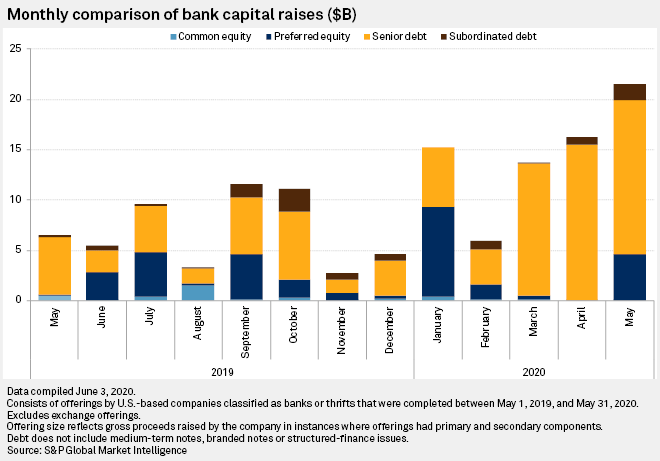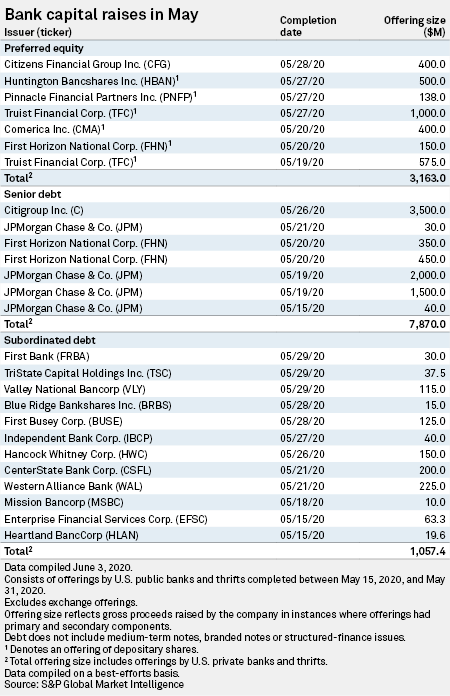Banks raised more capital in May than any month since the Great Financial Crisis as depositories sought to shore up their balance sheets.
Banks issued $21.51 billion of senior debt, subordinated debt or preferred equity in May, up from $6.49 billion in the year-ago month and the highest level since May 2009 when banks raised over $47 billion in capital. Senior debt was the most common form of capital raise for banks, followed by preferred equity. Bankers and analysts said the capital raises prepare depositories for the coming economic downturn from COVID-19, but banks could also use the funds for merger activity or organic growth if the recession is milder than anticipated.
"If the COVID-19 environment wasn't here, we certainly would not have gone out and raised this capital," said Stephen Erickson, CFO and corporate secretary of Grand Rapids, Mich.-based Independent Bank Corp., which issued $40 million of subordinated debt on May 27.

Raising subordinated debt is a form of "insurance" in case of credit losses from the COVID-19 pandemic to supplement the bank's robust capital base, Erickson said. Sub debt counts as Tier 2 capital, which is included in total risk-based capital ratios. Independent Bank reported a total risk-based capital ratio of 13.4% in the first quarter — before the sub debt raise — and a leverage ratio of 9.6%.
The bank has yet to see any significant impact from COVID-19 on its portfolio, Erickson said. "The extraordinary amount of liquidity and benefits that have been pumped into the economy really have created a delay between the economic impact of unemployment and ultimately any kind of credit events with consumers," Erickson said. He said some industries were hurting more than others, particularly restaurants, hospitality and travel.
Having "surplus" capital can also provide more options for banks, said Christopher Maher, chairman, president and CEO of Toms River, N.J.-based OceanFirst Financial Corp. OceanFirst issued $125 million in subordinated notes on April 29 and $55 million of depositary shares on May 1. Banks with more capital will have more options to help their customers with nonperforming loans or troubled debt restructurings, Maher said.
"This is not about losses or net charge-offs. It's about your ability, on your balance sheet, to work with your borrowers in an orderly and thoughtful way," Maher said. "The capital buys you time — with your clients and your regulators — to make the right decisions."
With the additional capital raise, OceanFirst can also pursue growth opportunities, either organically or through a merger, Maher said. The bank has been gaining new customers through the pandemic and has a history of acquisitions.
"We're in no rush to deploy that [capital]," Maher said. "We get to sit back and watch and assess the economic conditions."
Brett Rabatin, a consultant for the Travillian Group, said mergers may be likely if banks come out of the COVID-19 pandemic with extra capital. "Once things get back to 'normal,' I think you're going to see a lot of M&A for the simple reason that rates are probably not going to go up much, so the challenging revenue environment is not going to be lifted," he said in an interview.

Senior debt made up the bulk of banks' capital issuances in May, constituting just over 71% of the debt and preferred equity issued.
Since May 15, 18 banks have made new debt offerings. The largest was a $3.50 billion senior debt offering by Citigroup Inc. though JPMorgan Chase & Co. raised $3.57 billion of senior debt across four issuances.
Preferred equity was the second-largest category, and one that should grow in the near future, said Brady Gailey, an analyst with Keefe Bruyette & Woods.
"Preferred stock is another thing that we'll see more of over time. You want too much capital, not not-enough capital heading into a recession," Gailey said.
Subordinated debt offerings were smaller but still an attractive source of funding for several banks in the second half of May. The largest was a $225 million offering by Phoenix-based Western Alliance Bancorp., while the smallest was $10 million by Bakersfield, Calif.-based Mission Bancorp, based on U.S. public banks.
"The debt capital markets are open and they're still relatively cheap, so I think it's a great move for these banks, especially the ones that need a little more total risk-based capital," Gailey said. "It's a great move to bring in extra capital given the uncertain future of the economy."



